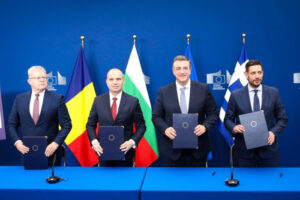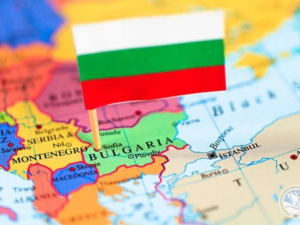
On February 1, Bulgaria ended its transition period for currency change, during which it was possible to pay in both Bulgarian levs and euros. Now, payments are made exclusively in euros, according to the Bulgarian service of Radio Liberty.
“At midnight on January 31, the one-month period during which the euro and the lev were in simultaneous circulation in Bulgaria ended. From February 1, merchants no longer accept payments in levs and must give change only in the single European currency,” according to a statement on the publication’s website.
People who still have cash levs can exchange them for euros at commercial banks and Bulgarian Post offices until June 30. After that date, commercial banks may set a certain exchange rate, but the Bulgarian National Bank will continue to offer cash lev-euro exchanges free of charge and without a deadline.
Retail chains will have to display prices for goods in both euros and levs for another six months, until August 8, “for transparency and to prevent speculative practices.”
Although the law prohibits sellers of goods and services from raising prices during the first six months of the euro’s introduction, hundreds of complaints about possible violations have already been received.
Bulgaria joined the eurozone on January 1, 2026, 18 years after joining the EU. January was a transition period when the lev and the euro were in circulation simultaneously.

Bulgaria, Greece, and Romania have agreed to prepare a joint application for European funding for a high-speed railway line along the “Western Axis” Athens-Thessaloniki-Sofia-Bucharest, according to the Bulgarian publication Sega.
According to the publication, the initiative was discussed at a meeting between representatives of the three countries and the European Commission in the context of the development of the North-South transport corridor, which is intended to connect the Baltic, Black and Aegean Seas. The meeting was hosted by Bulgarian Deputy Prime Minister and Minister of Transport Grozdan Karadzhov.
Greek Transport Minister Konstantinos Kiranakis said that by 2027, it is planned to provide high-quality passenger rail service between Thessaloniki and Sofia, while the Bulgarian side recalled that rail service on this route was interrupted in 2017.
Karadzhov also noted that the countries intend to synchronize planning, design, and permitting procedures to avoid delays and bureaucratic obstacles. Among Bulgaria’s priorities, he highlighted the acceleration of the project for a new bridge across the Danube between Ruse and Giurgiu, as well as the preparation of projects for new bridges in the Nikopol-Turnu Măgurele and Silistra-Kelerashi areas; the restoration of ferry connections on the Danube, including the Ruse-Giurgiu line, was also mentioned.
According to Sega, Romanian Transport Ministry representative Ionut Cristian Savoiu named among Romania’s priorities the modernization of the existing Giurgiu-Ruse bridge, the construction of a new Danube bridge, and the development of road and rail lines, as well as improvements on the Vidin – Calafat – Craiova section for better connectivity with Ukraine and Moldova.

Non-resident investments in Bulgarian real estate in January-November 2025 resulted in a net outflow of €18.6 million, while Russia recorded a net outflow of €19.9 million, according to data from the Bulgarian National Bank (BNB).
According to BNB data, a year earlier (January-November 2024), the net outflow of non-resident investments in real estate was estimated at €11.6 million.
The net outflow indicator means that non-residents’ payments under real estate agreements in the country during the period under review were lower than receipts, i.e., sales exceeded purchases in value terms. At the same time, the fact that the total indicator for all non-residents (-€18.6 million) was less than the outflow for the Russian Federation (-€19.9 million) formally indicates a small aggregate net inflow of investment in real estate from other countries (about €1.3 million).
The BNB report, which is referenced by the media, does not provide a separate breakdown by other countries (including Ukraine) in terms of non-resident investment in real estate—only Russia is highlighted separately.

On January 1, 2026, Bulgaria will adopt the single European currency, the euro.
“This is a historic step for the country and a boon for individuals and businesses in the euro area. The transition will lead to greater economic stability, smoother transactions, and stronger European integration. For Bulgaria, adopting the euro will help to better support long-term economic growth and strengthen its resilience,” according to a statement on the European Central Bank’s website.
The publication notes that “the changes may raise questions and concerns.” “However, the ECB and national authorities are working closely together to ensure a smooth transition for everyone through careful planning and a focus on price stability,” the European Central Bank assures.
Bulgaria is parting with its national currency, the lev, 19 years after joining the European Union. The press in the veteran eurozone countries points out that this will be convenient for tourists and travelers. However, there are concerns in Bulgaria itself, as the ECB acknowledges.
Expectations of benefits are overshadowed by concerns about possible price increases, as seen in Croatia, which joined the eurozone three years ago. These fears are all the more serious given that Bulgaria is one of the poorest countries in the EU.
Nevertheless, the European Commission (EC) considered that this Balkan country, which is becoming the 21st member of the eurozone, has met the relevant criteria: economic stability, public debt below 60% of GDP, and low inflation.
On June 4, 2025, the EC announced its conclusion that Bulgaria was ready to switch to the euro on January 1, 2026.
“Thanks to the euro, Bulgaria’s economy will become stronger, with more trade with eurozone partners, foreign direct investment, access to finance, quality jobs, and real incomes. And Bulgaria will take its rightful place in decision-making within the eurozone,” said EC President Ursula von der Leyen on this occasion.
The EU Council, in turn, announced on July 8, 2025, the approval of the last three legal acts necessary for the introduction of the euro in Bulgaria on January 1, 2026.
“This marks the culmination of a thorough accession process for Bulgaria, which has involved rigorous analysis and intensive preparation,” said Danish Economy Minister Stephanie Lose, who was chairing the EU Council at the time.
“One of the three legal acts sets the exchange rate between the euro and the Bulgarian lev at 1.95583 levs per euro. This corresponds to the current central rate of the lev in the Exchange Rate Mechanism II,” the EU Council said in a statement.
After Bulgaria joins the eurozone, six countries will remain in the EU that do not use this currency: Hungary, Denmark, Poland, Romania, the Czech Republic, and Sweden.
The European Monetary Union, or eurozone, began operating on January 1, 1999, when the single European currency, the euro, was introduced into non-cash circulation. Since March 1, 2002, the euro has been the sole legal tender in the eurozone. Eurozone countries transfer all monetary policy powers to the ECB, including decisions on the amount of money supply and the key interest rate.

In Bulgaria, amid the transition to the euro, some of the population remain concerned about possible price increases and heightened political tensions, according to media reports.
The country will join the eurozone on January 1, 2026, becoming the 21st country to adopt the single European currency.
There are also reports of a protest campaign under the slogan of preserving the Bulgarian lev, and according to Eurobarometer, about 49% of Bulgarians oppose the introduction of the euro.
The article notes that the ECB and European institutions point to the potential benefits of the transition, and the fixed conversion rate is set at 1.95583 leva per euro.
At the same time, according to media reports, the Bulgarian parliament strengthened control mechanisms in the summer to stop unjustified price increases when the currency changes.
Possible scenarios for the rise in the cost of living due to the introduction of the euro: the mildest scenario is a short-term “rounding” effect in retail trade, when some prices are rounded up, which usually contributes slightly and temporarily to inflation.
A more severe scenario is attempts by individual sellers and services to take advantage of the transition period and raise prices more than the conversion dictates, against the backdrop of already noticeable increases in the cost of food and real estate in 2025.
A negative scenario for citizens is if the rise in prices in the consumer basket outpaces the indexation of wages and pensions, real purchasing power will temporarily decline even with a formally small increase in inflation.

According to the Serbian Economist, Bulgaria has started accepting applications for a long-term stay permit on the basis of “digital nomad” – the relevant changes to the by-laws came into force on December 20, 2025.
As Bulgarian Telegraphic Agency reported, the introduction of the procedure for issuing such a permit is intended to create a clear procedure for foreigners who want to live in the country and work remotely without a relationship with a local employer, as well as to bring economic benefits by attracting specialists in innovation, high technology and creative industries.
Upon initial application or renewal of the permit, the applicant must, inter alia, prove an average annual income of at least 50 minimum monthly salaries for the previous calendar year and provide documents proving remote employment – an employment contract with the employer or contract(s) for remote services and recommendations from the customer(s), and the work or services must not be provided to persons and companies in Bulgaria.
Bulgarian legislation defines three categories of “digital nomads”: employees of an employer outside the EU/EEA/Switzerland; owners/shareholders (with a share of more than 25%) or management of companies registered outside the EU/EEA/Switzerland; and persons who have provided remote services for at least one year prior to the application, provided there is no employment on the Bulgarian market. The permit is valid for one year, renewable for another year; the procedure usually involves obtaining a D visa and subsequent regularization in Bulgaria.
https://t.me/relocationrs/1988